NOAA Sea Grant has announced the finalists for the 2025 John A. Knauss Marine Policy Fellowship program. Since 1979, the National Sea Grant College Program has provided one-year fellowships working in federal government offices in Washington, D.C. to over 1,300 early-career professionals. The 88 finalists in the 2025 class were nominated by Sea Grant programs across the country. The finalists include five from California Sea Grant.
Meet the 2025 California Sea Grant Knauss finalists
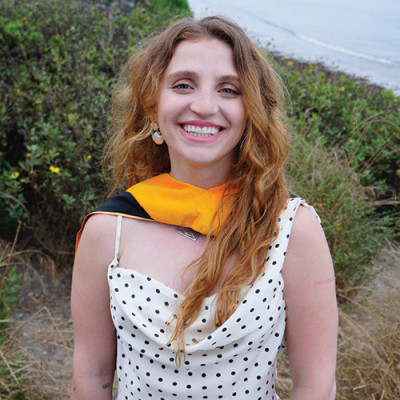
Kennedy Flavin, University of California, Santa Barbara, Legislative Branch
Kennedy's passion for ocean conservation was ignited during a fishing trip when she was ten, where she caught more plastic than fish. In 2021, she graduated with Bachelor of Science degrees in environmental sustainability science and political science and a minor in earth sciences from the University of Utah. During her undergraduate career, Kennedy served on the Associated Students of University of Utah’s Sustainability Board, where she organized Climate Change Anxiety Discussions and led advocacy efforts to preserve the Great Salt Lake.
In June, Kennedy graduated with a master's in coastal marine resources management from the Bren School of Environmental Science and Management at UC Santa Barbara, focusing on inclusive policies and impactful change in coastal management. Her work has involved collaborations with the Ocean Protection Council and NOAA Channel Islands Marine Sanctuary, where she has studied ocean access, marine protected areas (MPAs) and environmental justice for subsistence fishers in California.
As a dedicated environmental advocate and deaf individual, Kennedy is eager to leverage the Knauss Fellowship to drive change within coastal management, particularly in the MPA sector. She also aims to increase visibility and understanding of disabilities and deafness on Capitol Hill.
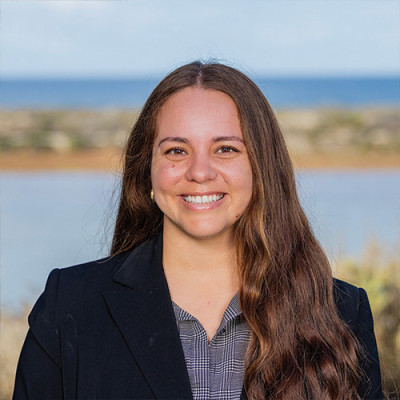
Roxanne-Alexa Garibay, San Jose State University, Executive Branch
Growing up, Roxanne always believed that she would work in healthcare. However, even after getting her undergraduate degree in biology from the University of California, Los Angeles, and volunteering in Peru at a mobile clinic for underserved communities, the ocean kept calling. She wanted to better understand these complex ecosystems and maybe even find easy ways to help communities through marine science.
Roxanne’s career has included roles in aquatic husbandry at the National Aquarium in Baltimore, Chair of the Future Leaders of Marine Science (FLMS) and as a scholar trainee with the Sustainable Oceans National Science Foundation Traineeship (SONRT). This past summer she worked with the California Ocean Science Trust to organize a legislative briefing on ocean noise, support socio-economic reports on fisheries resilience, and kick-off the nonprofits newsletter. Roxanne is pursuing a master’s in marine science at San Jose State University’s Moss Landing Marine Laboratories. There, she researches giant kelp biomass loss and reproduction.
Roxanne is dedicated to fostering a transdisciplinary dialogue across ocean policy, academia and communities. Through the Knauss Fellowship, Roxanne plans to enhance her policy skills and provide mentorship to a new generation of marine scientists.
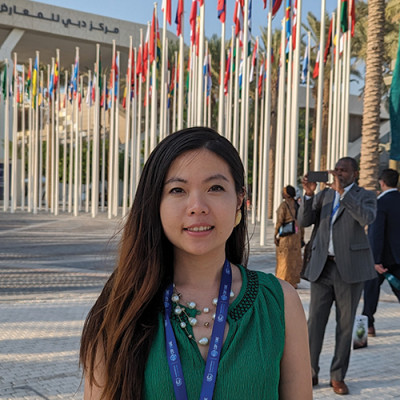
Chia Chun Angela Liang, University of California, Irvine, Executive Branch
Growing up in a coastal community in Taiwan, Angela has cultivated a lifelong love for the oceanic environment. However, as she delved deeper into the complexities of climate change, her concern for the future of coastal communities facing rising sea levels grew. Driven by a desire to contribute to solutions, Angela recently completed her PhD in earth system science at UC Irvine.
During her doctoral studies, Angela used remote sensing data, models and ground observations to investigate the evolution of ice in Antarctica and Greenland. A pivotal aspect of her research involved the use of GRACE and GRACE-FO, the first two satellites that measured the Earth's gravity field with exceptional precision. During her academic career, she was also a Voice for Science Fellow at the American Geophysical Union, co-founder and president of the UCI chapter of the National Science Policy Network and volunteered at the Taiwan Youth Climate Coalition.
Beyond her academic achievements, Angela is passionate about science policy, advocacy and diplomacy. She believes that addressing environmental and climate change challenges necessitates large-scale solutions. Angela is eager to apply her scientific knowledge to create tangible impacts and views the Knauss Fellowship as a stepping stone towards a career in science policy.
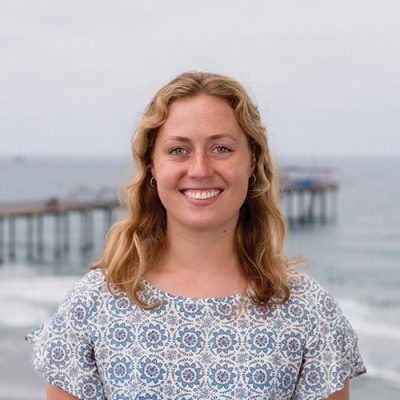
Eliza Thomas, University of California, San Diego, Executive Branch
Eliza, a lifelong coastal and marine enthusiast, developed a passion for climate-focused research after studying abroad with the Sea Education Association in the South Pacific. Following her undergraduate studies at Carleton College, she joined a team of scientists at the Cape Eleuthera Institute in the Bahamas to study coral reef restoration techniques in the Bahamas. She continued her work in reef restoration, focusing on oysters in Maryland and state-wide climate resilience efforts, eventually shifting her focus to bridging the gap between applied research and climate-informed policy.
As a recent graduate of the Scripps Institution of Oceanography's Master of Advanced Studies Program in Marine Biodiversity and Conservation program, Eliza was actively involved in various research projects, including offshore wind development impact studies, MPA design and management, coral monitoring, and leopard seal behavior assessment. During her graduate studies, she also worked with members of the Kumeyaay Nation to organize a coastal conservation and traditional ecological knowledge preservation project.
Throughout her career, Eliza has developed skills that are foundational to bridging the gaps between marine research, environmental justice and policymaking. She plans to leverage the Knauss Fellowship to gain hands-on experience in environmental policymaking, ultimately pursuing a career at the intersection of research and policy.
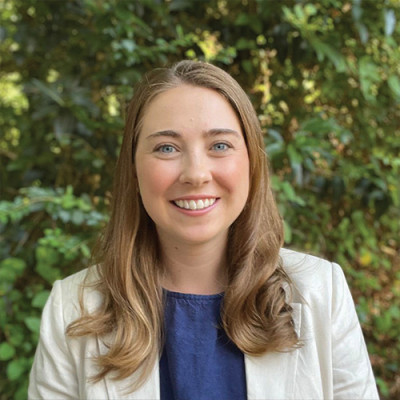
Madison Wood, University of California, Santa Cruz, Executive Branch
Madison was raised in a small farming town in Vermont and initially pursued a chemical engineering degree at the University of New Hampshire. Then a chance to attend a Fulbright UK Summer Institute in Exeter ignited a passion for earth sciences, particularly global climate change and paleoclimatology.
In August 2024, Madison completed her PhD in earth and planetary sciences at UC Santa Cruz. Her research focused on reconstructing strontium (Sr) isotopes in seawater to understand climate-related processes like continental weathering and carbonate burial. By analyzing marine barite, she sought to characterize carbon cycle fluxes and gain insights into the Earth's climate system.
Madison's geochemical research has deepened her understanding of the ocean's role in climate change and the potential impacts of ocean-based climate technologies. She hopes the Knauss fellowship will give her the opportunity to apply her expertise in marine biogeochemistry and let her help develop practical climate solutions.
Knauss finalists are chosen through a competitive process that includes several rounds of review at both the state Sea Grant program and national levels. Students that are enrolled in or have recently completed Masters, Juris Doctor (JD), and Doctor of Philosophy (PhD) programs with a focus and/or interest in marine and coastal science, policy or management apply to one of the 34 Sea Grant programs. If applicants are successful at the state program level, their applications are then reviewed by a national panel of experts.
Read more about all 88 finalists from the National Sea Grant Office.
About California Sea Grant
NOAA’s California Sea Grant College Program funds marine research, education and outreach throughout California. Headquartered at Scripps Institution of Oceanography at the University of California San Diego, California Sea Grant is one of 34 Sea Grant programs in the National Oceanic and Atmospheric Administration (NOAA), U.S. Department of Commerce.